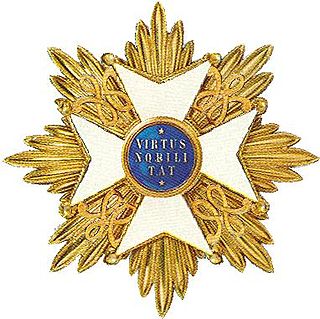
The Royal Netherlands Academy of Arts and Sciences is an organization dedicated to the advancement of science and literature in the Netherlands. The academy is housed in the Trippenhuis in Amsterdam.

Catharina-Amalia, Princess of Orange is the heir apparent to the throne of the Kingdom of the Netherlands, which consists of the constituent countries of Aruba, Curaçao, the Netherlands, and Sint Maarten.

The Dutch Language Union is an international regulatory institution that governs issues regarding the Dutch language. It is best known for its spelling reforms which are promulgated by member states, grammar books, the Green Booklet and its support of Dutch language courses and studies worldwide. It was founded on a treaty concluded between the Netherlands and Belgium on 9 September 1980. Suriname has been an associate member of the Taalunie since 2004.

The NIOD Institute for War, Holocaust and Genocide Studies is an organisation in the Netherlands which maintains archives and carries out historical studies into the Second World War, the Holocaust and other genocides around the world, past and present. The institute was founded as a merger of the Netherlands Institute for War Documentation and the Center for Holocaust and Genocide Studies (CHGS).

The Koninklijk Theater Tuschinski is a movie theatre in Amsterdam, Netherlands, near Rembrandtplein.

In the Dutch honours system, most orders are the responsibility of ministers of the Netherlands Government. The house orders, however, are awarded at the discretion of the Dutch monarch alone.

Carel Anton Fodor or Carolus Antonius Fodor was a Dutch pianist, conductor, and the most prominent composer of his generation in the Netherlands, writing in the manner of Joseph Haydn.
The Medal of the Royal Netherlands Meteorological Institute, or shortly KNMI Medal, is a royal decoration awarded by the Royal Netherlands Meteorological Institute (KNMI) to those officers or captains of the Dutch merchant navy who exceptionally support the Royal Netherlands Meteorological Institute by collecting and distributing observations about the weather at sea.
BMGN: Low Countries Historical Review is a peer-reviewed open-access academic journal covering the history of the Low Countries, which is taken to include the Netherlands and Belgium and their colonial and international involvements. It is published by the Royal Netherlands Historical Society, with articles appearing either in Dutch or in English. In June 2018 it was announced that Dirk Jan Wolffram would be taking over as chair of the editorial board.

The Netherlands Institute for the Near East is an institution for the advancement of the study of the Ancient Near East, Mesopotamia, Anatolia, and Egypt. It is an independent foundation with close ties to Leiden University, housed at the Faculty of Humanities. The institute was founded in 1939. In 2017 the board of NINO decided to integrate the library into Leiden university and to transform the institute to a pure "research school".

Annie Nicolette Zadoks-Josephus Jitta was a Dutch numismatist and archaeologist.
Hans Cools is a historian of early-modern Europe. He is a professor at the KU Leuven and a senior research fellow of the Fryske Akademy.

Cornelis Wind was a Dutch physicist. Wind was a pioneer in X-ray research. He died of bone marrow damage in 1911.
Petrus Josephus"Peter"van Kessel is a Dutch historian. He spent his career at the Royal Netherlands Institute in Rome, ultimately becoming vice director.
Frits Herman ('Kees') van Naerssen was a scholar of Javanese epigraphy and an early figure in Asian studies in post-war Australia.
Godefridus Johannes Hoogewerff (1884-1963) was a Dutch art historian.

Arie Abraham (Ary) Kampman was a Dutch scholar of Ancient Near Eastern studies, an initiator of scholarly societies and journals, and a secondary school teacher. Kampman obtained his Dutch PhD degree with professor Frans de Liagre Böhl on the 1945 thesis De historische beteekenis der Hethietische vestingbouwkunde. In 1939 he was a founder of the Nederlands Archaeologisch Instituut voor het Nabije Oosten, the predecessor of the present The Netherlands Institute for the Near East.

Franz "Frans" Marius Theodor de Liagre Böhl was a Dutch professor of Assyriology and Hebrew.












